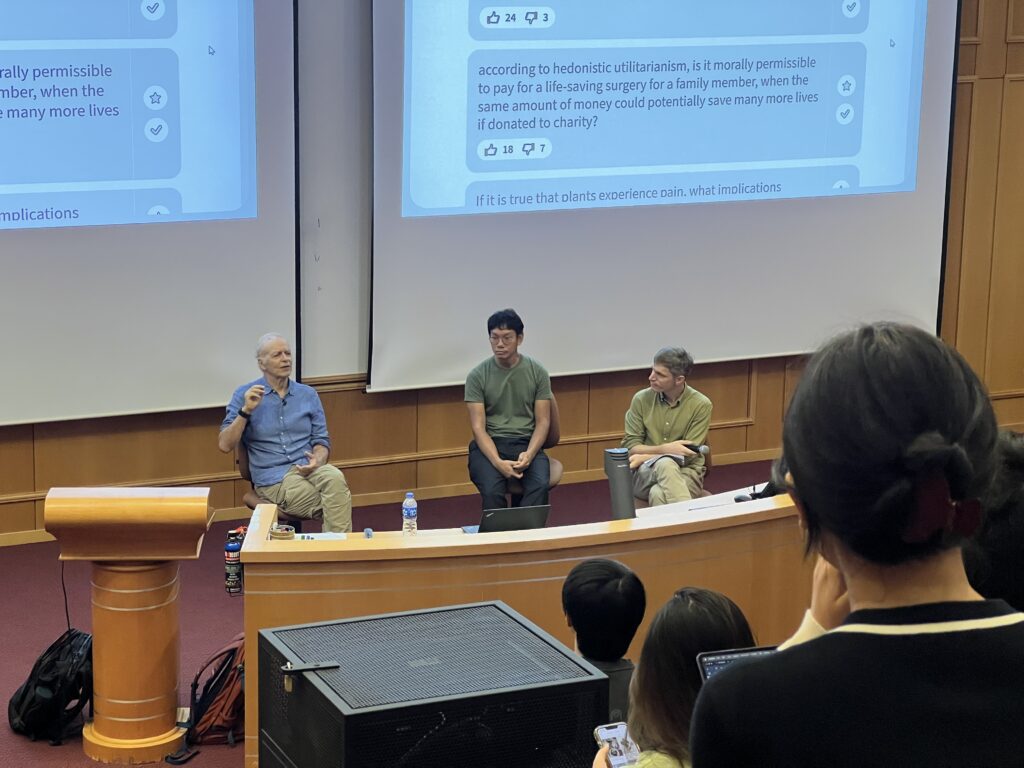New Course Charts Interdisciplinary Paths to Effective Altruism
November 22, 2024

‘How can we best use our resources to help others? How do we ensure that our efforts are effective in improving the wellbeing of others? The newly launched course at the NUS College of Humanities and Sciences (CHS), HS2921 Effective Altruism in Theory and Practice, is devoted to teaching approaches to answering questions such as these along interdisciplinary (crossing Economics and Philosophy) lines.
We ask the creators and instructors of this course in its maiden semester this year – Assistant Professor Martin Mattsson (NUS Economics) and Dr Joel Chow (NUS College and the Philosophy, Politics and Economics Cross-Disciplinary Programme, PPE-XDP) – why they developed this course on Effective Altruism and why it needs to be interdisciplinary.
“’Effective altruism’ is growing as a social movement globally, but there aren’t many university courses on the topic,” says Dr Mattsson, moving on to explain the need for interdisciplinarity. “A popular definition of Effective Altruism is to ‘use evidence and reason to figure out how to benefit others as much as possible and taking action on that basis’. When trying to figure out how to benefit others, we inevitably have to deal with complex questions such as ‘How can we best improve the lives of others?’ and ‘How can we reliably tell if our methods of benefiting others are effective?’ To address these questions, one has to leverage multiple academic disciplines. So, while the course mostly draws on Philosophy and Economics, it also touches on subjects like Political Science, Psychology, Engineering, and Computer Science.”
“Therefore, we believe it is a natural fit with the CHS common curriculum, as we hope to show students that to address complex real-world problems, we need to bring together insights from multiple disciplines and integrate them,” adds Dr Chow, who further points out that the syllabus they crafted and the assignment they set reflect this approach. “For example, in their work on the group project students are expected to analyse an intervention using philosophical and economic tools, and bring together these disciplines to better examine, and ultimately evaluate, an intervention on its impact and ability to benefit others.”
Equipping and Inspiring Students to Act on their Own
Dr Mattsson and Dr Chow’s syllabus for HS2921 seeks to train students in how to approach questions as a philosopher by evaluating non-empirical values such as our moral obligation towards the global poor, non-human animals and future populations. It also trains students in how to think like economists. For example, students are taught to identify situations in which markets can lead to good outcomes and in what situations interventions by governments or philanthropists are needed. Furthermore, the class encourages quantitative analysis using concepts such as expected value calculations and operationalised measures of human wellbeing such as quality adjusted life years.
“The main goal of the course is to provide students strategies for how to answer the question, ‘How can I benefit others as much as possible?’ and hopefully inspire some students to act on their own answers to that question,” says Dr Mattsson. “To do this we discuss different theories for what constitutes morally good behaviour, basic economic logic and evidence, and finally we do a deep dive into three fields that many in the Effective Altruism community think are areas where one can benefit others a lot.”
In examination of these three areas – welfare of the global poor, animal welfare and our legacy for future generations – with their students, Dr Mattsson and Dr Chow do not only just draw from the perspectives and ideas of other fields like social psychology and politics, but also call in major thought leaders, such as renowned utilitarian and Ira W. DeCamp Professor of Bioethics at Princeton University, Peter Singer, who delivered a lecture to their class early this month.

The Challenges and Advantage of Being Among the First
HS2921 is one of a few university courses in the world devoted to Effective Altruism and while that speaks well for its future popularity among students it also brought on unique challenges towards its launch.
Dr Mattsson explains. “Although Effective Altruism is growing as a social movement, there aren't many university courses on the topic and there are no textbooks. We are happy to teach the first university course on Effective Altruism, that we are aware of, in Asia, but it meant we had to create a lot of the materials ourselves,” he says. This was challenging as some of the topics, like existential risks, are quite far away from our own research and teaching focus. Fortunately, there are lots of great materials like books, blogposts, and podcasts, created by people both inside and outside the effective altruism movement and we drew on these materials to create our course.
Dr Chow indicates another issue they had to contend with in the development of their course. “It is also always challenging to teach students from very diverse academic backgrounds and with very different interests, most of whom have no background in neither Philosophy nor Economics,” he says. “We have tried to design the course so that students can follow their own interests and leveraging their own strengths by doing group projects and writing essays on topics of their choice. We hope that for some of the students these projects will be the first step towards a deeper engagement with these topics.”
All their challenges aside, Dr Mattsson and Dr Chow have seen enrolment to their course this semester exceed their initial expectations and are encouraged to consider hosting a larger class in future. “This is the first year that we are teaching the course, so we really didn't know what to expect in terms of student interest. We had set a cap of 100 students and gotten a lecture theatre with capacity for that enrollment,” says Dr Mattson. “We thought that this would be more than enough, but we were pleasantly surprised that more than 150 students tried to enroll in the course!”
“Yes, unfortunately we had to say no to some students due to space constraints,” says Dr Chow. “But we intend to increase the number of students we can accommodate in future years and hopefully the interest among students will continue to be strong.”

